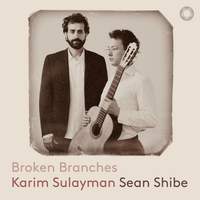Recording of the Week,
Broken Branches from Karim Sulayman and Sean Shibe
Limpid English lute-songs and tangled Orientalism
The tracklisting for Broken Branches starts with Dowland; its sleeve-notes (after the two artists’ introductions, at least) start by invoking influential postcolonial academic Edward Said. There could hardly be a clearer indication of what the album is about; a journey for guitar and voice through the various ways that music has engaged over the centuries with the foreign, the seemingly exotic, Said’s “Other”. This is not in and of itself a groundbreakingly new thing to do, but guitarist Sean Shibe and tenor Karim Sulayman dig deeper than most, drawing not only on their immense musical sensitivity but on their shared status as “third culture kids” – Shibe referencing his mixed Japanese-British parentage and Sulayman his diaspora status. Sulayman, in particular, brings a great deal of himself to these performances, with the emotional weight of his parents’ experiences fleeing the Lebanese Civil War, as well as his own as a Lebanese-American, worn very much on his sleeve.
Karim Sulayman and Sean Shibe perform John Dowland's Time stands still
The guitar at the heart of it all
It would be trite to describe this album as “bridging East and West” – the relationship is far more complex and interwoven than that, and that’s the point – but the guitar is surely uniquely placed to sit near the middle of things, if not as a bridge then as a centre of gravity, with its own lineage linking it to both Dowland’s lute-songs and the Arabic oud. The main idea that Shibe and Sulayman play around with throughout this album is the contrast between exoticised, garbled or merely half-remembered Western portrayals of the Eastern Mediterranean and East Asia, and the “real deal” – music from those areas themselves. Thus, after Dowland’s haunting Time stands still and Jonathan Harvey’s atmospheric, microtonal Sufi Dance, which the composer himself acknowledged as more impressionistic semi-memory than faithful transcription, a trio of Renaissance madrigals by Caccini and Monteverdi with at times distinctly questionable Eastward perspectives (above all “La mia turca” – “My Turkish girl”) leads into arrangements of traditional Sephardic and Arab-Andalusian love-songs, and works by Egyptian and Lebanese composers.
The anonymous La prima vez has a simple plaintiveness, for which Sulayman’s unfussy voice – light, with rapid but unobtrusive vibrato – and Shibe’s gentle accompaniment are perfect. Lebanese singer-songwriter Fairuz’s Li Beirut (For Beirut), with its instantly-familiar melody lifted straight from Rodrigo’s Concierto de Aranjuez and its impact heightened by Sulayman’s performance of the text’s yearning, richly poetic love-letter to his parents’ home city, offers a timely reminder that the cross-cultural borrowing of ideas has always gone in multiple directions rather than just one.
Karim Sulayman and Sean Shibe perform Fairuz's Li Beirut
If the first half of the album draws on Sulayman’s experiences and heritage, the second hands the baton to Shibe and the focus moves a few thousand miles further East, with Tōru Takemitsu’s ruminative Wainscot Pond (a real gem of a piece, well worth lingering over) teeing up Britten’s six Songs from the Chinese. Here the informal, intimate nature of Britten’s music – surely responding in part to Arthur Waley’s well-intentioned but uneven translation, whose turns of phrase make a loftier conception difficult – is captured perfectly by the duo.
An album that nudges and suggests, rather than lecturing
What precisely Shibe and Sulayman seek to say on this album is not wholly clear, but I’m not sure it needs to be. If anything they seem to embrace the ungraspable and ephemeral nature of these relationships and connections, offering up thought-provoking juxtapositions and letting the listener take from them what they will. Shibe’s discography is extensive and he’s already established a definite pedigree for eclecticism; for him, this album is another successful demonstration of his ability to weave a web of musical connections around a central subject. For Sulayman, while certainly not a debut (his recital of music by Monteverdi and contemporaries with Apollo’s Fire having won a Grammy in 2018), it’s a welcome raising of profile for an artist who I for one would very much like to hear more of. His voice combines what I might call an “early-music directness” with an open, easy sonority that’s a refreshing change from penetrating squillo. Mix in just a touch of breathiness, and taken together it makes him one of the most communicative singers I’ve heard for some time.
Karim Sulayman (tenor), Sean Shibe (guitar)
Available Formats: CD, MP3, FLAC, Hi-Res FLAC, Hi-Res+ FLAC



